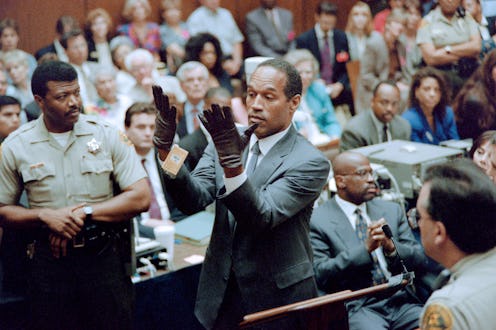Entertainment
O.J. Simpson's Health Has An Impact On 'ACS'
As The People v. O.J. Simpson: American Crime Story begins to wind down, viewers are seeing the last few components of the trial before the jury will deliberate and deliver the "not guilty" verdict. In this week's episode, the defense claims that O.J. Simpson has health problems, but is that true? While the former football star was still a large presence in the courtroom, he did reportedly have some health issues at the time of the 1995 trial.
As reported by the New York Times, Doctor Robert Huizenga testified that Simpson's physical condition had deteriorated so much from playing professional football that Simpson had trouble walking. Dr. Huizenga claimed that old football injuries left Simpson with a "damaged right ankle" and a "left knee [that] needed to be replaced and who could neither move forward nor laterally with ease," according to the NY Times. The doctor had also examined Simpson two and a half days after the murders and said in his testimony, "on the day I saw [Simpson], he had significantly limited mobility ... Fast walking, slow jogging would be difficult if not impossible." Huizenga also theorized that Simpson suffered from night sweats, which could explain why he was visibly sweaty when taking a limo to the airport in the hours following the murders.
But the most significant effect that Simpson's health had on the trial was his arthritis, which some speculate made it hard for Simpson to do the glove demonstration. Prosecutor Chris Darden told the Los Angeles Times that he believed Simpson allegedly stopped taking his arthritis medication in order to make his hands swell to the point where the gloves looked too small. "We are told that he has not taken the stuff for a day, and it caused swelling in the joints and inflammation in his hands," Darden claimed to the newspaper. Defense attorney Johnnie Cochran did not directly deny Darden's accusation, but did call the prosecutors "paranoid" in response. Doctor Earnest Brahn, a rheumatologist, told the LA Times, "the kind of joint deformities that we see in rheumatoid arthritis can impact on whether a glove might fit. But many of the drugs that we administer take weeks or months to achieve their anti-inflammatory effect."
So according to these reports, Simpson's health became a big part of the trial, but that shouldn't be surprising. As American Crime Story has shown, for everyone involved in the trial, every single aspect of their lives was subject to intense scrutiny.
